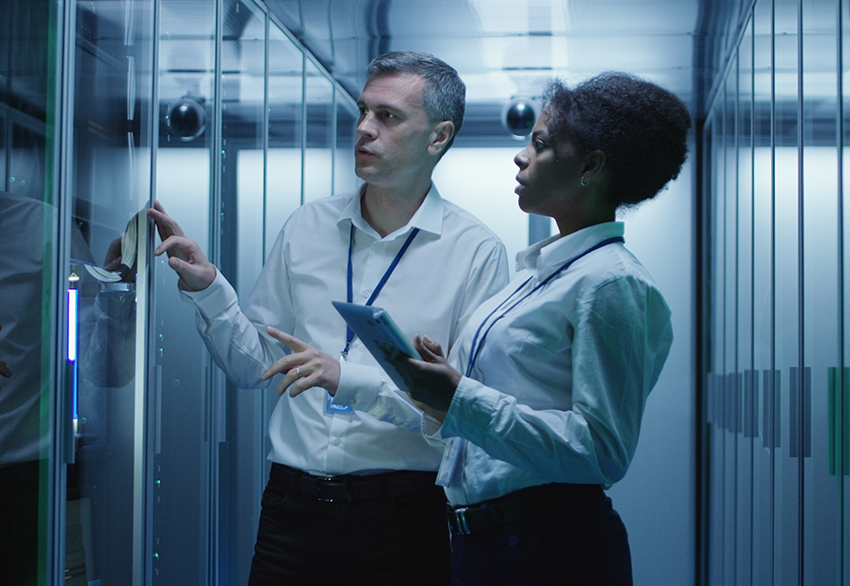Technology and trust must go hand in hand

John E. Kaye
- Published
- Home, Technology

Story by Yves de Beauregard (Head of Digital Business Solutions at Fujitsu EMEIA)
Technology is now a fundamental part of daily life, enabling everything from payments and communication to transport and healthcare. However, while digital technology has led to positive innovations, it has also created pressing business issues such as increased cyber-threats, widespread speculation of job losses and personal data hacks.
And as technology becomes further integrated into our work and social lives these challenges will only increase. To address them, businesses must create an open, transparent conversation to develop the trust needed to embrace new technologies – and ensure staff and customers are aware of the positive impact they can have.
This article will explore the future of technology in the workplace, and why businesses must cultivate a trustworthy image, internally and externally, to remain successful.
A workplace transformed

Technology in the workplace must incorporate trust.
Technology has spread throughout the workplace and revolutionised almost every business process, from flexible working to the automation of day-to-day tasks. For example, FAIR – Fujitsu’s Advanced Image Recognition – uses AI to free skilled workers to focus on more value-added activities and is helping companies to save money in the manufacturing industry.
Despite these benefits, AI is raising concerns for workers that need to rely on and, in some cases, relinquish control to a machine. In fact, 60% of respondents in Fujitsu’s ‘Global Digital Transformation Survey’ said they wouldn’t trust AI on its own. It is clear that businesses need to minimise the negative perception of AI to ensure employees feel comfortable to make the most of the technology.
One company that understands this is Unilever. The consumer goods company improved its recruitment process, using it to filter through thousands of applications and giving accurate feedback to the unsuccessful candidates. However, the final decision on who to hire was still made by Unilever’s leadership and recruitment team. It is a fantastic example of how AI can help solve issues central to global businesses, while also eradicating a wider recruitment issue.
The most reasoned approach, therefore, is to automate time-consuming tasks, with employees making the decisions that require insight and expertise. This approach will lead to new ways of working, such as collaborative robots (cobots) that work safely alongside humans. Trust needs to be central to the future workplace. Only then can we create applications that support, not replace, the workforce.
Nurturing tomorrow’s talent

The youth of today are digital natives.
As technology becomes increasingly integrated into all aspects of society, it will not only impact the workplace but also the future careers of our children. The youth of today are digital natives, growing up in a world where the sharing economy, drone deliveries and electric vehicles are commonplace. Indeed, tomorrow’s generation will embrace this digital-ready world and create a workplace that looks entirely different from what we are used to today.
With that in mind, businesses have a responsibility to nurture the right digital skills, and within that, instill a code of ethics that ensures technology is an aid rather than the authority in the working relationship. If you consider the impact of AI, our children will have to fill an estimated 133 million new jobs designed to work alongside the technology.
Whether it’s AI, automation, IoT, or machine-learning, new technologies will always be scrutinised by the workforce if businesses fail to be transparent and trustworthy in their digital transformation.
The bigger picture

Human-centric technology brings people together.
Technology is undoubtedly prevalent in all aspects of our lives. And it has the potential to be a force for good. It has created an opportunity for people of all ages to have access to education, leisure and networks that were once unimaginable.
For technology to truly transform lives, businesses must collaborate with the government, local communities, charities and each other. Fujitsu’s ‘Co-creation for Success’ research found that businesses will struggle to deliver innovation when acting alone. Innovation doesn’t necessarily mean a new product or service. It can also be a new way of thinking, with trust in mind and a greater awareness of the ethical issues that technology-led ideas will raise.
For example, the ‘Fujitsu Group AI Commitment’ is made up of five pillars: provide value to customers and society with AI; strive for human-centric AI; strive for a sustainable society with AI; strive for AI that respects and supports people’s decision making; as CSR, emphasise transparency and accountability for AI. This forms the basis of our ongoing commitment to develop trusted AI that serves human’s needs, not the other way around.
Central to this is our wider philosophy of human-centric technology, which is all about bringing together people, information and infrastructure to help humans do what they do best. This approach is ultimately the best way for tech to enhance all elements of society in a trustworthy way.
From the home to the workplace, technology is having a profound impact on everyone’s lives. The instances above are just a few practical scenarios of how technology is, and will, transform society.
Moving forward, businesses must work together to make their technology a unified force for good, so that they can truly enhance citizens’ lives. For this to work, businesses must think ethically, while developing services with the purpose to benefit the wider population and society. Only then will the workforce of the future trust our technology.
Further information
www.fujitsu.com/global/themes/co-creation
For more technology news, follow The European.
RECENT ARTICLES
-
 AI-driven phishing surges 204% as firms face a malicious email every 19 seconds
AI-driven phishing surges 204% as firms face a malicious email every 19 seconds -
 Deepfake celebrity ads drive new wave of investment scams
Deepfake celebrity ads drive new wave of investment scams -
 Europe eyes Australia-style social media crackdown for children
Europe eyes Australia-style social media crackdown for children -
 Europe opens NanoIC pilot line to design the computer chips of the 2030s
Europe opens NanoIC pilot line to design the computer chips of the 2030s -
 Building the materials of tomorrow one atom at a time: fiction or reality?
Building the materials of tomorrow one atom at a time: fiction or reality? -
 Universe ‘should be thicker than this’, say scientists after biggest sky survey ever
Universe ‘should be thicker than this’, say scientists after biggest sky survey ever -
 Lasers finally unlock mystery of Charles Darwin’s specimen jars
Lasers finally unlock mystery of Charles Darwin’s specimen jars -
 Women, science and the price of integrity
Women, science and the price of integrity -
 Meet the AI-powered robot that can sort, load and run your laundry on its own
Meet the AI-powered robot that can sort, load and run your laundry on its own -
 UK organisations still falling short on GDPR compliance, benchmark report finds
UK organisations still falling short on GDPR compliance, benchmark report finds -
 A practical playbook for securing mission-critical information
A practical playbook for securing mission-critical information -
 Cracking open the black box: why AI-powered cybersecurity still needs human eyes
Cracking open the black box: why AI-powered cybersecurity still needs human eyes -
 Tech addiction: the hidden cybersecurity threat
Tech addiction: the hidden cybersecurity threat -
 Parliament invites cyber experts to give evidence on new UK cyber security bill
Parliament invites cyber experts to give evidence on new UK cyber security bill -
 ISF warns geopolitics will be the defining cybersecurity risk of 2026
ISF warns geopolitics will be the defining cybersecurity risk of 2026 -
 AI boom triggers new wave of data-centre investment across Europe
AI boom triggers new wave of data-centre investment across Europe -
 Make boards legally liable for cyber attacks, security chief warns
Make boards legally liable for cyber attacks, security chief warns -
 AI innovation linked to a shrinking share of income for European workers
AI innovation linked to a shrinking share of income for European workers -
 Europe emphasises AI governance as North America moves faster towards autonomy, Digitate research shows
Europe emphasises AI governance as North America moves faster towards autonomy, Digitate research shows -
 Surgeons just changed medicine forever using hotel internet connection
Surgeons just changed medicine forever using hotel internet connection -
 Curium’s expansion into transformative therapy offers fresh hope against cancer
Curium’s expansion into transformative therapy offers fresh hope against cancer -
 What to consider before going all in on AI-driven email security
What to consider before going all in on AI-driven email security -
 GrayMatter Robotics opens 100,000-sq-ft AI robotics innovation centre in California
GrayMatter Robotics opens 100,000-sq-ft AI robotics innovation centre in California -
 The silent deal-killer: why cyber due diligence is non-negotiable in M&As
The silent deal-killer: why cyber due diligence is non-negotiable in M&As -
 South African students develop tech concept to tackle hunger using AI and blockchain
South African students develop tech concept to tackle hunger using AI and blockchain



























